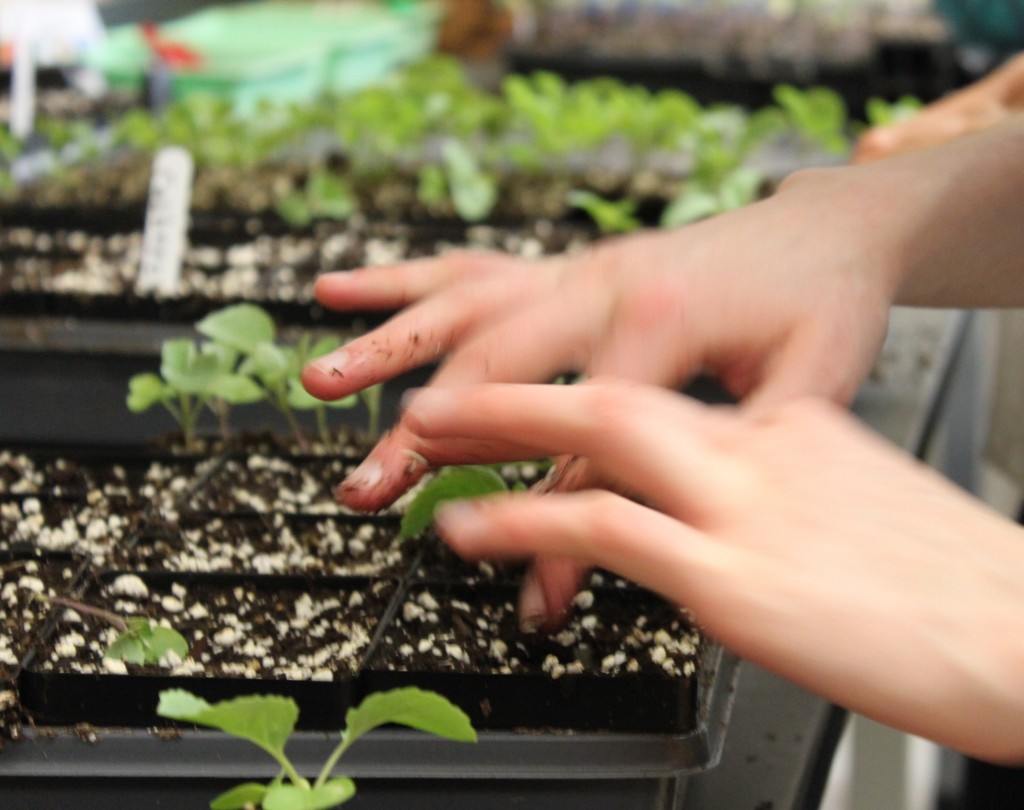
With warmer weather and sunnier days, St. Thomas students and faculty and members of the St. Paul community are eager to work in the St. Thomas community garden.
Seedlings for the garden are currently growing in the on-campus greenhouse and will be transplanted in the community garden behind what was formerly the Common Ground house.
Adam Kay, project adviser and biology professor, said the garden gives students firsthand experience on important environmental and social lessons.
“It combines student-led research, education, service and community-outreach in a single project,” Kay said. “On one level, the garden is an ecology research project. Specifically, we are testing how crop biodiversity and organic farming practices affect plant growth and produce yield in an urban garden setting.”
Kay said the garden will help others learn about biodiversity.
“On another level, the garden is an educational platform. The public is becoming increasingly aware of issues concerning food production and of global threats to biodiversity,” Kay said. “The garden project has provided us with opportunities to spread the word about the importance of these issues.”
The community garden has also been a service-learning opportunity. Last year, garden members donated more than 400 pounds of produce to the Emergency Food Shelf Network in New Hope, Minn.
Urban agriculture
Kay and student organizers junior Aaron Hays and sophomore Ashela Richardson attended the Urban Agricultural Summit to learn more about urban gardening and how to apply these ideas to the St. Thomas community garden.
The summit was sponsored by Gardening Matters, a central organizing hub for community gardening in the Twin Cities.
“It was sort of the beginning of a process to see what needs to happen with the urban agriculture movement and how we can make that happen,” Hays said. “It’s a big process, but coming back from that it was really great to see what’s all happening in the Twin Cities, and also how our garden here can fit into that.”
Garden plans
Richardson said a variety of seedlings will be added to the garden this spring and summer, including bell peppers, large tomatoes, cherry tomatoes, green beans, potatoes and cabbage.
“[It’s] just a really good mix so that it’s really diverse,” she said. “And then we have a fun plot where we’re going to do herbs, arugula. Just some various things people want to grow, just to have.”
The garden is only in its second year, but Hays said there are plans to double the garden’s size.
“Half of that [produce] will still go to food shelves,” Hays said. “And half of it will be available for people [who] help out and also for some events we’re going to have on campus.”
Kay added, “We will be planning events throughout the summer to raise awareness about food issues, gardening and biodiversity research.”
Hays said these events will draw in incoming students in addition to community members.
“We’re talking with Multicultural Student Services and trying to create a program [that] brings incoming first-years to St. Thomas for about five weeks,” Hays said. “They’d live here and we’re trying to get some programming set up where they can come and be a part of the community garden here as well.”
Plants and student diversity
The St. Thomas community garden currently includes about 30 participants from various departments and campus organizations.
Richardson said the garden allows her to meet people with similar interests. She added that she hopes more students and community members become involved this spring and summer.
“I hope that it can turn into a place where people from everywhere in the university, not just science or not just humanities, can come and get together,” she said. “That’s really the core of what a community garden should be.”
Green Team member freshman Madeline Anderson said she hopes to continue working on the garden during the summer.
“It’s going to take a while for all of these [seedlings] to grow, so it’s a lot of work, but it will be really fun to see how everything plays out and what we accomplish,” she said.
Rebecca Omastiak can be reached at omas5009@stthomas.edu.
